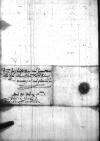Plures, quas ad Vestram Reverendissimam Dominationem mensibus decursis dedi litteras Vestrae Dominationis benignissimum et peroptatum desiderant responsum, verum, quia vereor, ne infidi eas interceperint vel neglexerint tabellarii, rescribere decrevi non nimis veritus Vestrae Dominationis benignissimas aures tot litteris offendere, posthac tuae Dominationi summa in next line⌈aa in next line⌉ benignitas et proprii honoris sollicitudo et tot diuturnae ac humanissimae expromissiones in me omnem spem de tua virtute concitaverunt. Verum quia de mense Septembris sequentis anni proximi futuri in provincia Calabria, region in southern Italy, south of Naples⌊CalabriaeCalabria, region in southern Italy, south of Naples⌋ vacat administratio unius ex auditoribus dictae provinciae, quae solent alias decerni per biennium et alias per triennium, propterea Vestram Reverendissimam Dominationem habeo orig. abeo⌈habeohabeo orig. abeo⌉ exoratam, ut dictae provinciae Calabriae proximam vacaturam audientiae administrationem per triennium a Charles V of Habsburg (*1500 – †1558), ruler of the Burgundian territories (1506-1555), King of Spain as Charles I (1516-1556), King of Naples and Sicily, King of the Romans (1519-1530), Holy Roman Emperor of the German Nation (elected 1519, crowned 1530, abdicated 1556); son of Philip I the Handsome and Joanna the Mad of Castile⌊caesareCharles V of Habsburg (*1500 – †1558), ruler of the Burgundian territories (1506-1555), King of Spain as Charles I (1516-1556), King of Naples and Sicily, King of the Romans (1519-1530), Holy Roman Emperor of the German Nation (elected 1519, crowned 1530, abdicated 1556); son of Philip I the Handsome and Joanna the Mad of Castile⌋ pro me impetrare dignetur ms. dige...(!)
⌈digneturdignetur ms. dige...(!)
⌉, et quidquid erogare necesse erit, per litteras cambii per bancos The Welsers merchant and banking family from Augsburg with close ties to Emperor Charles V⌊Belzerorum(!)The Welsers merchant and banking family from Augsburg with close ties to Emperor Charles V⌋ remittere, quod in Bari (Barium, Status Barensis), duchy in southern Italy, on the Adriatic Sea, Bari was a hereditary country of Queen Bona of Poland⌊hac civitateBari (Barium, Status Barensis), duchy in southern Italy, on the Adriatic Sea, Bari was a hereditary country of Queen Bona of Poland⌋ habent orig. abent⌈habenthabent orig. abent⌉ negotiatores et respondentes, vel Naples (Napoli, Neapolis), city in Italy, on the coast of the Tyrrhenian Sea, capital of the region of Campania⌊Neapoli{s}Naples (Napoli, Neapolis), city in Italy, on the coast of the Tyrrhenian Sea, capital of the region of Campania⌋, et statim remittentur, et perquam gratissime, et si remittere(n)t<ur>, dictam administrationem decernere per triennium Vestram Dominationem exoro, ut instet pro obtinenda triennali administratione, quia solet alias concedi et magno mihi erit commodo et honori. Vale, Reverendissime Domine, et me totum honorem quam meum Vestrae Reverendissimae Dominationi
 AAWO, AB, D. 6, f. 152v
tutissime et benignissime protectioni committo et mando hidden by binding⌈[o]o hidden by binding⌉.
AAWO, AB, D. 6, f. 152v
tutissime et benignissime protectioni committo et mando hidden by binding⌈[o]o hidden by binding⌉.
 AAWO, AB, D. 6, f. 1 unnumbered after f. 152
AAWO, AB, D. 6, f. 1 unnumbered after f. 152
 AAWO, AB, D. 6, f. 152v
tutissime et benignissime protectioni committo et mando hidden by binding⌈[o]o hidden by binding⌉.
AAWO, AB, D. 6, f. 152v
tutissime et benignissime protectioni committo et mando hidden by binding⌈[o]o hidden by binding⌉.


